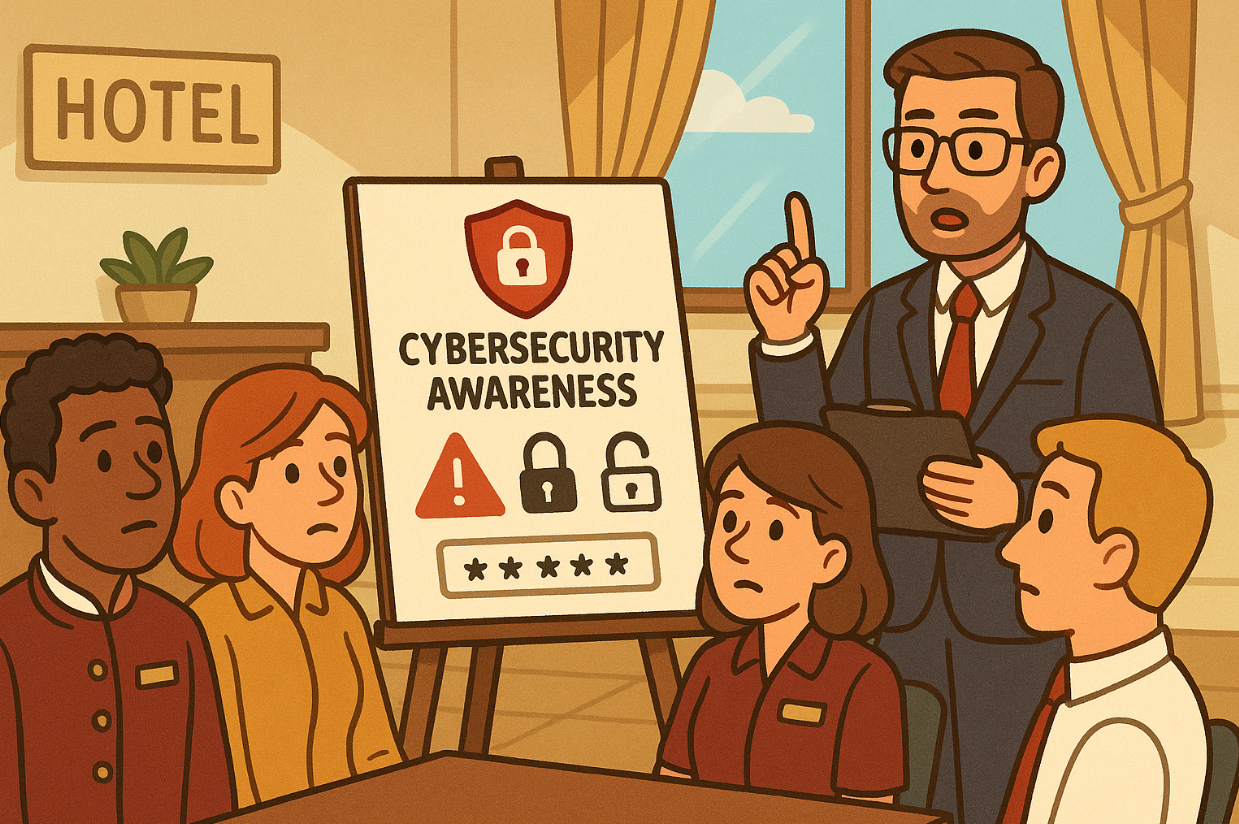Hospitality Industry Strengthens Cyber Resilience Through Comprehensive Awareness and Communications Training Program
The Challenge
Aurora Hospitality Group, a national hotel and resort management company, began experiencing increasing cybersecurity exposure due to inconsistent employee awareness and fragmented communication practices across its locations. Despite investing heavily in network security, digital guest systems, and compliance programs, human error remained the leading cause of incidents, including misdirected emails containing guest data, weak password practices, and delayed breach notifications.
An internal privacy audit revealed that 45% of staff were unfamiliar with their data protection obligations under the Personal Information Protection and Electronic Documents Act (PIPEDA), and communication breakdowns between operations, IT, and guest services hindered incident response coordination. These weaknesses raised concerns from insurers and international booking partners who required verified cybersecurity awareness and staff training attestations.
Leadership recognized that while the organization’s technology posture was sound, its workforce culture needed transformation. Sustaining cyber resilience would require consistent training, transparent communication, and an informed workforce committed to protecting guest data and corporate reputation.
Our Solution
Our Awareness and Communications Training team was engaged to design and implement a Hospitality Cyber Awareness and Communications Enablement Program customized for Aurora’s distributed hospitality operations, including resorts, hotels, and central booking offices.
The engagement began with a culture and capability audit to assess behavioural risks, communication flow, and staff understanding of cybersecurity responsibilities. Insights from this assessment informed a multi-phase program integrating awareness training, leadership engagement, and proactive communication.
Key initiatives included:
- Development of a tiered Hospitality Cyber Awareness Curriculum covering phishing defense, privacy compliance, payment card data handling (PCI DSS), and secure guest communication practices.
- Launch of the “CyberSmart Hospitality” campaign, combining interactive workshops, site posters, and digital micro-learning modules to reinforce daily best practices.
- Creation of an Executive and Frontline Communication Playbook defining protocols for incident notification, guest disclosure, and escalation to legal or compliance teams.
- Implementation of a centralized awareness dashboard tracking participation, test results, and incident response performance metrics across all hotel properties.
- Quarterly phishing simulations and scenario-based training tailored to real-world hospitality risks such as point-of-sale fraud and booking system phishing.
All program elements were aligned with PIPEDA, ISO/IEC 27001, and the NIST Cybersecurity Framework (Awareness and Training), ensuring that employees at all levels understood their role in safeguarding guest information and operational continuity.
The Value
Within six months, Aurora Hospitality achieved measurable improvements in employee behaviour, compliance posture, and incident response coordination:
- 85% completion rate for mandatory awareness training across all business units in the first quarter.
- 60% reduction in successful phishing attempts following targeted education and simulated exercises.
- Full compliance validation during third-party audits, supporting renewal of cyber insurance and PCI DSS certification.
- Improved cross-departmental communication, reducing average incident reporting and escalation times by 50%.
- Enhanced guest confidence and partner assurance through visible commitment to cybersecurity and data protection training.
By embedding awareness and communication into the organization’s culture, Aurora transformed cybersecurity from an IT obligation into a shared service value — strengthening resilience, reputation, and regulatory readiness across all operations.
Implementation Roadmap
- Assessment (Weeks 1–3): Conduct workforce awareness survey, review internal communication workflows, and identify behavioural risk areas.
- Program Design (Weeks 4–6): Develop tailored curriculum, executive playbook, and multi-channel communication materials.
- Deployment (Weeks 7–12): Launch “CyberSmart Hospitality” campaign, deliver live and e-learning sessions, and activate awareness dashboard.
- Reinforcement (Weeks 13–16): Conduct phishing simulations, feedback workshops, and performance scorecard reviews.
- Continuous Improvement (Ongoing): Refresh training content quarterly, update communication materials, and integrate awareness KPIs into performance evaluations.
Info Sheet
Necessary Action Type and Steps to Be Taken:
- Conduct baseline awareness and communication assessment across all departments.
- Develop and deploy tiered Cyber Awareness Curriculum aligned with PIPEDA and PCI DSS standards.
- Establish clear communication playbooks for incident reporting, guest notification, and escalation.
- Execute regular phishing simulations and awareness campaigns.
- Maintain centralized dashboards for tracking participation, metrics, and compliance readiness.
- Incorporate awareness participation into annual performance and audit evaluations.
Industry Sector: Hospitality — Hotels, Resorts, and Guest Services
Applicable Legislation:
– PIPEDA (Personal Information Protection and Electronic Documents Act)
– ISO/IEC 27001 (Information Security Management)
– NIST Cybersecurity Framework (Awareness and Training)
– PCI DSS (Payment Card Industry Data Security Standard)
Third Parties:
– E-learning and awareness content provider
– Managed awareness platform vendor
– Cyber insurance and compliance auditors
– Legal counsel for privacy and incident communication
– International booking and travel partners requiring training attestations


